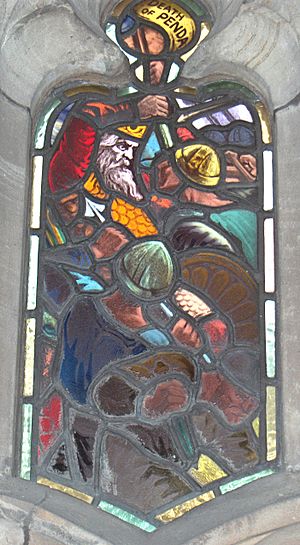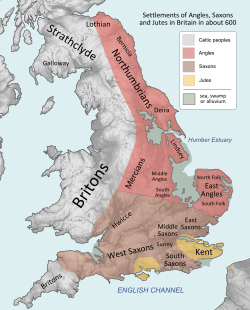Penda of Mercia facts for kids
Quick facts for kids Penda |
|
|---|---|

Stained glass window, depicting the death of Penda at the Battle of the Winwaed, Worcester Cathedral
|
|
| King of Mercia | |
| Reign | c.626 – 655 AD
or c.633 – 655 AD or c.642 – 655 AD |
| Predecessor | Cearl |
| Successor | Peada |
| Born | c. 606 |
| Died | 15 November 655 (aged 48–49) Possibly the Cock Beck, at the Battle of the Winwaed |
| Spouse | Cynewise |
| Issue | Peada Wulfhere Æthelred Merewalh Cyneburh Cyneswith |
| Dynasty | Iclingas |
| Father | Pybba |
| Religion | Pagan |
Penda (died 15 November 655) was a powerful king of Mercia in the 7th century. Mercia was an Anglo-Saxon kingdom located in what is now the Midlands of England. Penda was a pagan (someone who followed older, non-Christian religions) during a time when Christianity was becoming popular in many Anglo-Saxon kingdoms.
Penda became very important after taking control of the Severn Valley in 628. He then helped defeat the strong Northumbrian king Edwin at the Battle of Hatfield Chase in 633. Nine years later, he won another major victory, killing Edwin's successor, Oswald, at the Battle of Maserfield. After this, Penda was likely the most powerful ruler among the Anglo-Saxons. He laid the groundwork for Mercia to become the leading kingdom in England.
Penda often fought against the East Angles and forced Cenwalh, the king of Wessex, into exile for three years. He continued his wars against the Northumbrians. However, 13 years after Maserfield, Penda was defeated and killed by Oswald's brother, Oswiu, at the Battle of the Winwaed in 655.
Contents
Penda's Family and Early Reign
Penda was the son of Pybba of Mercia. His family, the Iclingas, claimed to be descendants of the god Wōden. The Historia Brittonum (a historical writing) says that Pybba had 12 sons, but Penda and his brother Eowa of Mercia were the most famous.
It is not clear exactly when Penda became king. Another Mercian king, Cearl, ruled earlier in the 7th century. We don't know if Penda took over right after Cearl or if they were related.
The Anglo-Saxon Chronicle says Penda became king in 626 and ruled for 30 years. It also says he was 50 years old when he became king. However, historians doubt he was 50 in 626 because his children were still young when he died. It's more likely he was around 20 in 626.
Bede, a famous historian, wrote that Penda was "a most warlike man." Bede said Penda ruled the Mercians for 22 years after Edwin's defeat in 633. Historians generally believe Bede's timeline for Penda's reign is the most accurate.

Battles and Growing Power
Battle with the West Saxons
In 628, Penda fought a battle against the West Saxons at Cirencester. The West Saxons were led by their kings Cynegils and Cwichelm. After the battle, Penda and the West Saxons "came to an agreement." This agreement likely meant Penda won, gaining control of Cirencester and lands along the lower River Severn. These lands later became part of the Hwicce kingdom.
Alliance with Cadwallon and Hatfield Chase
In the early 630s, Cadwallon ap Cadfan, the British (Welsh) king of Gwynedd, was fighting against Edwin of Northumbria. Edwin was the most powerful king in Britain at that time. Cadwallon and Penda formed an alliance. In October 633, they defeated the Northumbrians at the Battle of Hatfield Chase. King Edwin was killed in this battle.
Penda likely became king of Mercia soon after this victory. Cadwallon continued to fight, but Penda's involvement after Hatfield Chase is not clear. Penda's success in this battle greatly increased his standing among the Mercians. This helped him become their king.
Penda's Reign and Major Victories
Penda and King Oswald
After Cadwallon's defeat, Oswald became king of Northumbria. Penda's actions during Oswald's reign are not fully known. It is thought that Penda was a challenge to Northumbrian power in southern England.
At some point, Penda had Edwin's son, Eadfrith, killed. This was "contrary to his oath," meaning he broke a promise. Historians think Oswald might have pressured Penda to do this, as Eadfrith was a rival to Oswald.
Penda also fought and defeated the East Angles. He killed their king, Egric, and a former king, Sigebert. This battle showed Penda's growing power and ambition.
Battle of Maserfield
On 5 August 642, Penda won a huge victory against the Northumbrians at the Battle of Maserfield. This battle was fought near Welsh lands, and King Oswald was killed. Some Welsh poems suggest Penda was allied with the people of Powys in this battle.
Penda's brother, Eowa, was also killed at Maserfield. It is not known which side Eowa fought on. Some historians think he might have been ruling part of Mercia as a subject of Oswald. If so, his death would have made Penda the undisputed ruler of Mercia.
The Battle of Maserfield gave Penda incredible power. He became the most powerful Mercian king ever. Northumbria was greatly weakened and split into two parts: Deira in the south and Bernicia in the north. Penda's victory made Mercia much stronger compared to the surrounding kingdoms.
Later Campaigns and Alliances
Wars and Influence in Southern England
After Maserfield, Northumbrian influence over the West Saxons weakened. The new West Saxon king, Cenwealh, was married to Penda's sister. This suggests he was under Mercian influence. However, when Cenwealh divorced Penda's sister, Penda drove him into exile in East Anglia in 645. Cenwealh stayed there for three years.
In 654, Penda killed the East Anglian king Anna, who had given shelter to Cenwealh. Anna's brother, Aethelhere, became king. Aethelhere later joined Penda's invasion of Northumbria, suggesting Penda might have put him in power. Penda's wars against the East Angles likely aimed to secure Mercian control over Middle Anglia. Penda made his son, Peada, ruler of Middle Anglia.
Conflicts with Northumbria
Penda also attacked Oswiu of Bernicia's territory. Before 651, Bede wrote that Penda "cruelly ravaged the country of the Northumbrians." He even besieged Bamburgh, a royal stronghold. When the Mercians couldn't capture it, they tried to burn it down. However, Bede says a strong wind, sent by the saintly Bishop Aidan, blew the fire back, saving the city.
Years later, Penda attacked the area where Aidan died, burning everything. No major battles were fought between Penda and Oswiu before the Battle of the Winwaed in 655. This might mean Oswiu avoided battle because he felt weaker than Penda.
Family Ties and Christianity
Despite the wars, Penda and Oswiu had some family connections. Penda's daughter, Cyneburh, married Alhfrith, Oswiu's son. Also, Penda's son, Peada, married Alhflaed, Oswiu's daughter.
Bede says that Peada's marriage depended on him becoming a Christian. Peada agreed, and Christian priests began preaching in Middle Anglia, which he ruled. Penda seemed to tolerate Christianity, as there is no evidence he tried to stop it. However, some historians see Peada's conversion as a political move by Oswiu to increase Northumbrian influence.
Final Campaign and Death
The Battle of the Winwaed
In 655, Penda launched a large invasion of Bernicia. His army was huge, with 30 warbands and 30 royal commanders. Kings like Cadafael of Gwynedd and Aethelhere of East Anglia joined him. Aethelwald, the king of Deira, also supported Penda.
The reason for this war is not fully clear. Some think Penda saw Northumbrian Christianity in Mercia as a threat to his power. Others believe he wanted to stop Oswiu from reuniting Northumbria.
The Historia Brittonum says Penda besieged Oswiu at Iudeu, possibly Stirling. Oswiu tried to buy peace by offering treasure, but Penda refused. Penda wanted to destroy Oswiu's entire nation. Oswiu's son, Ecgfrith, was being held hostage by Penda.
Penda's army then moved south. On 15 November, a great battle was fought near the Cock Beck river in the region of Loidis (modern-day Leeds). The river was swollen with heavy rains. Penda's army was weakened by desertions. Cadafael of Gwynedd left with his army, and Aethelwald of Deira withdrew.
The Mercians were badly defeated, and Penda was killed. The East Anglian king Aethelhere also died. Many of Penda's commanders were killed, and more drowned trying to escape.
Aftermath and Legacy
After Penda's defeat at the Winwaed, Oswiu briefly controlled Mercia. He allowed Penda's son, Peada, to rule the southern part. Later, two of Penda's other sons, Wulfhere and Æthelred, became kings of Mercia after Northumbrian control ended. Penda's family ruled Mercia until his grandson, Ceolred, died in 716.
Penda's reign was very important for Mercia. Before him, Mercia was not well known. Penda made Mercia a powerful kingdom. His battles, though sometimes confusing to historians, show how he helped Mercia grow.
Penda was the last great pagan warrior-king among the Anglo-Saxons. After his death, the Mercians became Christian. All three of Penda's sons who ruled were Christians. His daughters, Cyneburh and Cyneswith, became Christian saints.
Most of what we know about Penda comes from Bede, a Northumbrian priest. Bede was a Christian and often wrote about Penda as a villain because Penda was pagan and fought against Christian kings. However, Penda's greatest importance was his strong opposition to Northumbrian power. Without Penda's resistance, Northumbria might have united England much earlier.
Penda's Children
Penda's wife was Queen Cynewise. They had five sons and two daughters:
- Peada: Became King of Mercia after his father. He married Ealhflæd, King Oswiu's daughter.
- Wulfhere: King of Mercia from 658–675.
- Æthelred: King of Mercia from 675–704.
- Merewalh: King of the Magonsæte.
- Mercelmus
- Cyneburh: Married Alhfrith, King of Deira and son of King Oswiu.
- Cyneswith: Became a nun.
Portrayals in Media
Penda has appeared in books and television:
- King Penda's Captain (1908) by MacKenzie MacBride
- The Soul of a Serf (1910) by J. Breckenridge Ellis
- He was played by Geoffrey Staines in Penda's Fen (1974) (BBC TV).
- He was played by Leo McKern in The Coming of the Cross (1975) (BBC TV).
The Pendas Fields estate in Leeds is named after Penda because of the association of his death with the area.
Images for kids
-
Stained glass window, depicting the death of Penda at the Battle of the Winwaed, Worcester Cathedral
-
A map showing the general locations of the Anglo-Saxon peoples around the year 600
See also
 In Spanish: Penda de Mercia para niños
In Spanish: Penda de Mercia para niños




